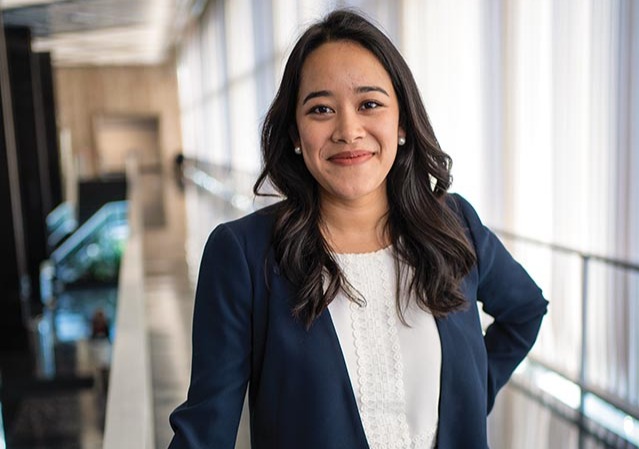When the Taliban captured the city of Kabul in 2021, many Afghans with claims to special immigrant visas fled to Islamabad, Pakistan. “Given its proximity to Kabul, Islamabad ended up being a hub for a lot of the evacuation efforts for U.S.-affiliated Afghans — people who had previously worked for or were affiliated with the U.S. government,” explains Ranissa Adityavarman ’16, who was working at the U.S. Embassy in Islamabad at the time.
Adityavarman played a key role in the effort to help with emergency evacuations by arranging urgent flights and exit permissions for evacuees. As a foreign service officer (FSO), she says, “[you have to have] the ability to learn quickly, because there will be a need for you to step into things you might not have expected.”
An international relations major and economics minor, she became inspired to become a diplomat when she met one in Paris on Colgate’s Geneva Study Group in 2015. “It opened my eyes to the amazing experiences you can have living abroad, but also the diversity of experiences you can have as an FSO.”
During her years at Colgate, Adityavarman participated in an extended study trip to South Africa, interned at a maternal health clinic in Indonesia, and interned for a New York City–based nongovernmental organization that aids schools in Zambia. “Every one of those experiences was supported by or affiliated with Colgate,” she says. “I credit Colgate for supporting students through organized methods of engaging abroad.”
In her senior year, Adityavarman received the Charles B. Rangel fellowship, which supported her studies at Cornell University for her master’s degree in public administration. While studying at Cornell for two years, she worked as a fellow at the U.S. Embassy in Canberra, Australia, conducted agricultural research in Kenya, and completed her capstone project in Greece.
After graduation, she began training at the State Department’s Foreign Service Institute, where she focused on becoming fluent in another language. “My life for that entire year was basically studying Arabic for six hours every day,” she says.
Her first assignment was then in Amman, Jordan, working in the consular section of the embassy. When COVID-19 hit, Adityavarman was part of the team helping American citizens return home. Her duties regarding the pandemic continued during her next assignment in Islamabad, where USAID coordinated vaccine deliveries. “It was a huge bilateral effort because Pakistan was [one of the top] recipients of U.S.- donated COVID vaccines worldwide,” says Adityavarman, who covered environment, science, technology, and health issues at the time.
Today she’s based in Washington, D.C., handling international media engagement by connecting the State Department with outlets like the BBC and CNN International.
As she looks toward the trajectory of her future, Adityavarman says, “I’m not sure exactly what area of the world I’ll be in, but I hope I can continue to work in international relations as long as I feel like I’m serving the American people.”
This article represents the opinions of Adityavarman, not the United States Department of State.

